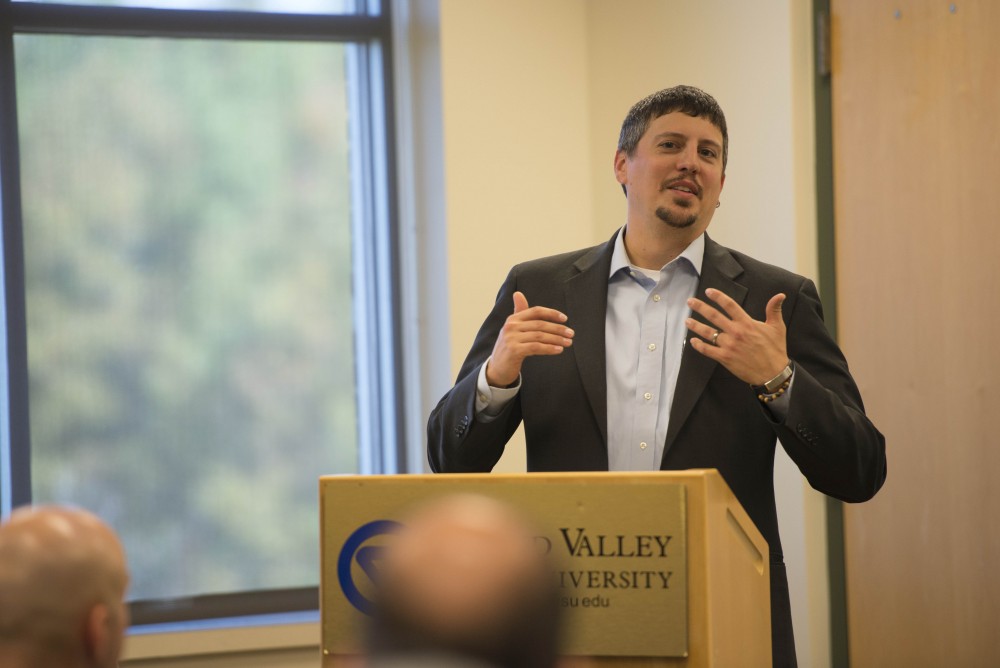Former U.S. national security adviser speaks about Iran at GVSU

GVL / Luke Holmes – Richard Nephew gives “The Iran Project Lecture” in Kirkhof 2215 on Tuesday, Oct. 25, 2016.
Oct 27, 2016
Richard Nephew was the director for Iran at the National Security Council from 2011-13. He worked on developing sanctions for Iran and was later asked to be a part of the negotiations publicly as the Joint Comprehensive Plan of Action (JCPOA) or the Iranian nuclear deal. He also helped advise the U.S. State Department for sanctions against other countries such as Russia, North Korea, Libya, Syria and the Islamic State.
Nephew spoke to a group of students and staff from political science, Middle East studies, international relations and history at Grand Valley State University Tuesday, Oct. 25. Some also came to hear Nephew speak of his knowledge of Iran that was used to shape his career in imposing sanctions against the country and the inner workings of the Iranian nuclear deal.
The World Affairs Council received a grant from the Iran Project to help raise awareness of the issue of Iran by bringing in different speakers across the U.S. The Iran Project is sending policy, security, nuclear and Iranian experts to foster understanding of what the Iranian nuclear deal entails, challenges the U.S. will face, and how the transition of power following November’s election will shape U.S. and Iranian relations.
Coeli Fitzpatrick, coordinator for the Middle East studies program, said GVSU is borrowing Nephew from the World Affairs Council in order to give students an opportunity to hear an expert opinion on Iran and the Middle East.
“When you get into a country like Iran, (it) is sort of this scary monster. We hear Iran is the state sponsor of terrorism, Iran is involved in a proxy war in Syria and in Yemen,” Fitzpatrick said. “Just to have somebody come here and talk about Iran from an expert point of view is a good thing.”
Nephew said he worked closely with Secretary of State John Kerry and his senior staff concerning sanctions against Iran. He also said he has briefed the president of the U.S. several times on Iran and sanctions against Iran, saying that one time the president remarked “What is there left to sanction inside Iran?” in 2012. Nephew said the president took a lot of briefings on Iran and it was a high area of focus for him.
Nephew said he has been studying the country of Iran for several years and reading about it as well. He was involved in sanctioning the country for its nuclear program since 2006, which is why government officials asked him to be apart of the negotiating process for the nuclear deal. He is often called an expert on Iran, but he claims the country is truly understood by few people.
“As one Iranian-American said, ‘No one is an expert on Iran, we’re all just students,’” Nephew said.
The Iranian nuclear deal has been reprimanded and criticized by many U.S. lawmakers and politicians. Republican nominee for president Donald Trump called the nuclear deal “disastrous” although Nephew said he doesn’t take it personally.
“If anything, government service teaches you is that you can’t take these things personally because you’ll be taking things personally all day,” Nephew said. “There’s never going to be 100 percent agreement of anything we do is good. It’s far from a disaster, it’s potentially the mechanism by which we prevent Iran from acquiring nuclear weapons in the future.”
Nephew said the deal is not perfect and there were changes he wanted to be made before the deal was finalized. But he said the deal does what it was made to do.
“The deal itself achieves the objectives that it set out to achieve, which is to arrest Iran’s nuclear weapons ambitions,” Nephew said. “Whether it was another 10 to 15 years of restrictions we could’ve gotten, that would’ve been ideal, but we weren’t going to be able to get all that.”
Nephew said he wanted students to have a better appreciation of the complexities that surround U.S. and Iran relations and to understand it does not simply come down to “good vs. evil” because there are some good issues and some bad issues.
“Ultimately just screaming ‘the Iranians are evil’ is not going to solve anything,” he said. “And we really need to think about what our interests are, what kinds of solutions we’re prepared to accept and what kinds of negotiations we’re willing to have with the Iranians. And that takes a little bit more care and sophistication in our thinking about Iran.”

























